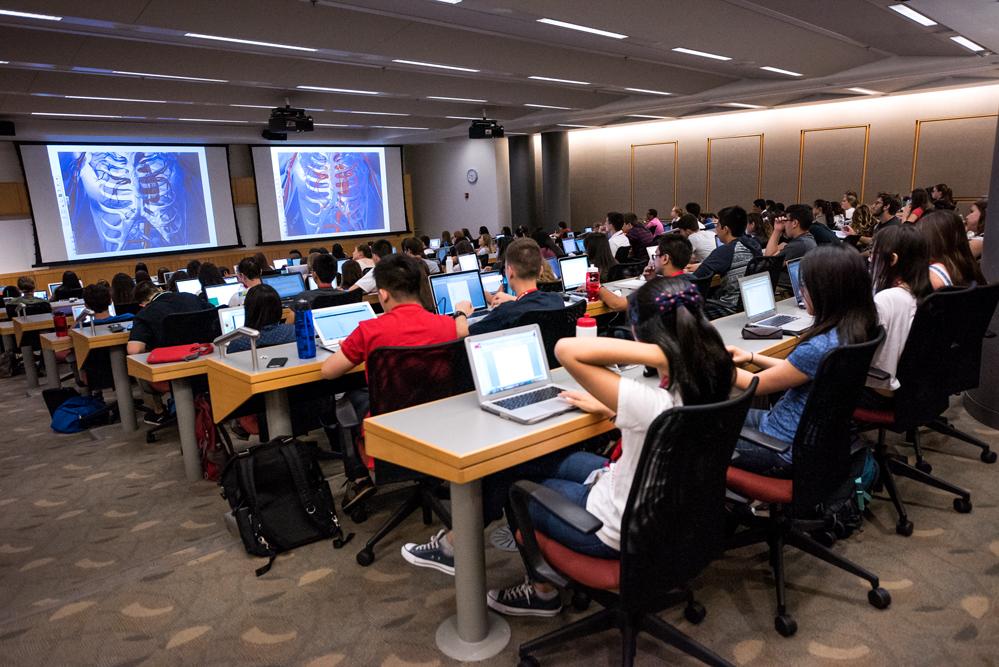High school students in the pre-college course, "Introduction to Medicine: Do You Want to Be a Doctor?" at Brown University
If you're in high school, there's no escaping the college-application madness ― even during the lazy days of summer. Some students are now enrolling in expensive pre-college summer courses they hope will catch the eye of admissions officers they’d like to impress.
But experts say it’d be a mistake to think these courses give anyone a leg up in the admissions game.
Sophie Uldry knew early on that she wanted to go to Brown, the highly selective Ivy League university hundreds of miles from her home in Puerto Rico. This summer, she is ― kind of.
“It’s very different from my school,” she says. "It’s a lot of work.”
The 15-year-old is taking a summer course here in Providence called “Introduction to Medicine: Do You Want to Be a Doctor?”
"My mom was like, 'I see you being a doctor,' and I was like, 'Really? Well, I should try it out,'" says Sophie.
Some students pay the full $5,500 sticker price. Others, like Sophie, receive scholarships.
It's 8:30 in the morning, and Sophie and 140 other teenagers file into a large lecture hall proudly wearing their Brown T-shirts and lanyards. Today's lesson? Cardiac arrest.
There’s no credit for the three-week course. For Sophie, it’s more about hoping this summer school will pay off in another way.
"I've been looking into the school to see if I could get accepted since last year," she says.
There’s nothing in the online video advertising Brown’s camp that promises admission, but the pictures of students studying in Brown’s library and playing Frisbee on the quad can be enticing to students who set their sights on a selective school.
“I do a lot of activities in Puerto Rico,” Sophie says. “I’m an all around student. I do almost anything and I know that will help me for getting in," she adds.
But Brown's dean of admissions Jim Miller doesn’t give any extra weight to summer programs.
"Zero,” he says. “We actually don't know who’s been to our summer school. Some tell us. Some don't. We have no idea what courses they’ve taken. We have no idea what their grades are."
Miller says the university doesn't favor anyone who's had the resources to attend summer courses.
"We are very conscious about drawing a pretty clear line," says Miller.
And faculty here say the program is about more than building a resume.
"It's a lot about where do you want to go to college,” says Dr. Juli Ip, associate dean of medicine and a teacher of this summer course. “And what is it like to be independent, live in a dorm, and not have mom and dad to here to tell you what to do."
Ip admits she encouraged her own son to take the university’s summer engineering program. And even she worries about the heightening admissions competition.
“I’m crossing my fingers, that it doesn’t contribute to the mania, but, in fact, helps the students think for themselves," says Ip.
College counselors say it all depends on students and their families. Beth Heaton works as a private counselor in Newton, Massachusetts, helping teenagers get into selective schools that are increasingly out of reach.
“If you’re going into it with the idea that, ‘Well I’m going to do this program and therefore I’m going to be a more competitive candidate,’ I think it can contribute to the mania,” says Heaton.
Before she was a college coach, Heaton worked in admissions at the University of Pennsylvania. She says when she saw summer programs like Brown’s on applications, she was unimpressed.
"I did not place much value on them when I was at Penn and reading files,” she says. “What I really felt was, ‘Oh great, more school. And it’s really wonderful that the student had this opportunity,’ but to me it didn’t help them stand out in any way."
While these programs don’t improve students' chances, Heaton says living on campus for a few weeks can calm their nerves in what's become a stressful process.
“There is value to be had. The question is, is it worth the high price, and then the big thing also is, it doesn’t have to be at a big name school. ”
And, Heaton admits, when it comes to elite college admissions, summer should be less about getting an ivy league lanyard, and more about getting some life experience.
This story was produced by On Campus, a public radio reporting initiative focused on higher education produced in Boston at WGBH.
Every day, reporters and producers at The World are hard at work bringing you human-centered news from across the globe. But we can’t do it without you. We need your support to ensure we can continue this work for another year.
Make a gift today, and you’ll help us unlock a matching gift of $67,000!
